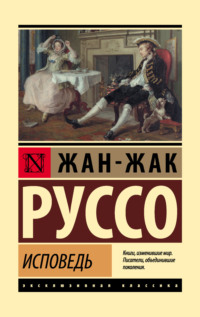 полная версия
полная версияThe Confessions of Jean Jacques Rousseau — Volume 06
I apprehended that I should meet with difficulties, on account of having changed my religion, but none occurred; the laws of Geneva being less harsh in that particular than those of Berne, where, whoever changes his religion, not only loses his freedom, but his property. My rights, however, were not disputed: but I found my patrimony, I know not how, reduced to very little, and though it was known almost to a certainty that my brother was dead, yet, as there was no legal proof, I could not lay claim to his share, which I left without regret to my father, who enjoyed it as long as he lived. No sooner were the necessary formalities adjusted, and I had received my money, some of which I expended in books, than I flew with the remainder to Madam de Warrens; my heart beat with joy during the journey, and the moment in which I gave the money into her hands, was to me a thousand times more delightful than that which gave it into mine. She received this with a simplicity common to great souls, who, doing similar actions without effort, see them without admiration; indeed it was almost all expended for my use, for it would have been employed in the same manner had it come from any other quarter.
My health was not yet re-established; I decayed visibly, was pale as death, and reduced to an absolute skeleton; the beating of my arteries was extreme, my palpitations were frequent: I was sensible of a continual oppression, and my weakness became at length so great, that I could scarcely move or step without danger of suffocation, stoop without vertigoes, or lift even the smallest weight, which reduced me to the most tormenting inaction for a man so naturally stirring as myself. It is certain my disorder was in a great measure hypochondriacal. The vapors is a malady common to people in fortunate situations: the tears I frequently shed, without reason; the lively alarms I felt on the falling of a leaf, or the fluttering of a bird; inequality of humor in the calm of a most pleasing life; lassitude which made me weary even of happiness, and carried sensibility to extravagance, were an instance of this. We are so little formed for felicity, that when the soul and body do not suffer together, they must necessarily endure separate inconveniences, the good state of the one being almost always injurious to the happiness of the other. Had all the pleasure of life courted me, my weakened frame would not have permitted the enjoyment of them, without my being able to particularize the real seat of my complaint; yet in the decline of life; after having encountered very serious and real evils, my body seemed to regain its strength, as if on purpose to encounter additional misfortunes; and, at the moment I write this, though infirm, near sixty, and overwhelmed with every kind of sorrow, I feel more ability to suffer than I ever possessed for enjoyment when in the very flower of my age, and in the bosom of real happiness.
To complete me, I had mingled a little physiology among my other readings: I set about studying anatomy, and considering the multitude, movement, and wonderful construction of the various parts that composed the human machine; my apprehensions were instantly increased, I expected to feel mine deranged twenty times a day, and far from being surprised to find myself dying, was astonished that I yet existed! I could not read the description of any malady without thinking it mine, and, had I not been already indisposed, I am certain I should have become so from this study. Finding in every disease symptoms similar to mine, I fancied I had them all, and, at length, gained one more troublesome than any I yet suffered, which I had thought myself delivered from; this was, a violent inclination to seek a cure; which it is very difficult to suppress, when once a person begins reading physical books. By searching, reflecting, and comparing, I became persuaded that the foundation of my complaint was a polypus at the heart, and Doctor Salomon appeared to coincide with the idea. Reasonably this opinion should have confirmed my former resolution of considering myself past cure; this, however, was not the case; on the contrary; I exerted every power of my understanding in search of a remedy for a polypus, resolving to undertake this marvellous cure.
In a journey which Anet had made to Montpelier, to see the physical garden there, and visit Monsieur Sauvages, the demonstrator, he had been informed that Monsieur Fizes had cured a polypus similar to that I fancied myself afflicted with: Madam de Warrens, recollecting this circumstance, mentioned it to me, and nothing more was necessary to inspire me with a desire to consult Monsieur Fizes. The hope of recovery gave me courage and strength to undertake the journey; the money from Geneva furnished the means; Madam de Warrens, far from dissuading, entreated me to go: behold me, therefore, without further ceremony, set out for Montpelier!—but it was not necessary to go so far to find the cure I was in search of.
Finding the motion of the horse too fatiguing, I had hired a chaise at Grenoble, and on entering Moirans, five or six other chaises arrived in a rank after mine. The greater part of these were in the train of a new married lady called Madam du Colombier; with her was a Madam de Larnage, not so young or handsome as the former, yet not less amiable. The bride was to stop at Romans, but the other lady was to pursue her route as far as Saint-Andiol, near the bridge du St. Esprit. With my natural timidity it will not be conjectured that I was very ready at forming an acquaintance with these fine ladies, and the company that attended them; but travelling the same road, lodging at the same inns, and being obliged to eat at the same table, the acquaintance seemed unavoidable, as any backwardness on my part would have got me the character of a very unsociable being: it was formed then, and even sooner than I desired, for all this bustle was by no means convenient to a person in ill health, particularly to one of my humor. Curiosity renders these vixens extremely insinuating; they accomplish their design of becoming acquainted with a man by endeavoring to turn his brain, and this was precisely what happened to me. Madam du Colombier was too much surrounded by her young gallants to have any opportunity of paying much attention to me; besides, it was not worthwhile, as we were to separate in so short a time; but Madam de Larnage (less attended to than her young friend) had to provide herself for the remainder of the journey; behold me, then, attacked by Madam de Larnage, and adieu to poor Jean Jacques, or rather farewell to fever, vapors, and polypus; all completely vanished when in her presence. The ill state of my health was the first subject of our conversation; they saw I was indisposed, knew I was going to Montpelier, but my air and manner certainly did not exhibit the appearance of a libertine, since it was clear by what followed they did not suspect I was going there for a reason that carries many that road.
In the morning they sent to inquire after my health and invite me to take chocolate with them, and when I made my appearance asked how I had passed the night. Once, according to my praiseworthy custom of speaking without thought, I replied, "I did not know," which answer naturally made them conclude I was a fool: but, on questioning me further; the examination turned out so far to my advantage, that I rather rose in their opinion, and I once heard Madam du Colombier say to her friend, "He is amiable, but not sufficiently acquainted with the world." These words were a great encouragement, and assisted me in rendering myself agreeable.
As we became more familiar, it was natural to give each other some little account of whence we came and who we were: this embarrassed me greatly, for I was sensible that in good company and among women of spirit, the very name of a new convert would utterly undo me. I know not by what whimsicallity I resolved to pass for an Englishman; however, in consequence of that determination I gave myself out for a Jacobite, and was readily believed. They called me Monsieur Dudding, which was the name I assumed with my new character, and a cursed Marquis Torignan, who was one of the company, an invalid like myself, and both old and ill —tempered, took it in his head to begin a long conversation with me. He spoke of King James, of the Pretender, and the old court of St. Germain's; I sat on thorns the whole time, for I was totally unacquainted with all these except what little I had picked up in the account of Earl Hamilton, and from the gazettes; however, I made such fortunate use of the little I did know as to extricate myself from this dilemma, happy in not being questioned on the English language, which I did not know a single word of.
The company were all very agreeable; we looked forward to the moment of separation with regret, and therefore made snails' journeys. We arrived one Sunday at St. Marcelein's; Madam de Larnage would go to mass; I accompanied her, and had nearly ruined all my affairs, for by my modest reserved countenance during the service, she concluded me a bigot, and conceived a very indifferent opinion of me, as I learned from her own account two days after. It required a great deal of gallantry on my part to efface this ill impression, or rather Madam de Larnage (who was not easily disheartened) determined to risk the first advances, and see how I should behave. She made several, but far from being presuming on my figure, I thought she was making sport of me: full of this ridiculous idea there was no folly I was not guilty of.
Madam de Larnage persisted in such caressing behavior, that a much wiser man than myself could hardly have taken it seriously. The more obvious her advances were, the more I was confirmed in my mistake, and what increased my torment, I found I was really in love with her. I frequently said to myself, and sometimes to her, sighing, "Ah! why is not all this real? then should I be the most fortunate of men." I am inclined to think my stupidity did but increase her resolution, and make her determined to get the better of it.
We left Madam du Colombier at Romans; after which Madam de Larnage, the Marquis de Torignan, and myself continued our route slowly, and in the most agreeable manner. The marquis, though indisposed, and rather ill-humored, was an agreeable companion, but was not best pleased at seeing the lady bestow all her attentions on me, while he passed unregarded; for Madam de Larnage took so little care to conceal her inclination, that he perceived it sooner than I did, and his sarcasms must have given me that confidence I could not presume to take from the kindness of the lady, if by a surmise, which no one but myself could have blundered on, I had not imagined they perfectly understood each other, and were agreed to turn my passion into ridicule. This foolish idea completed my stupidity, making me act the most ridiculous part, while, had I listened to the feelings of my heart, I might have been performing one far more brilliant. I am astonished that Madam de Larnage was not disgusted at my folly, and did not discard me with disdain; but she plainly perceived there was more bashfulness than indifference in my composition.
We arrived at Valence to dinner, and according to our usual custom passed the remainder of the day there. We lodged out of the city, at the St. James, an inn I shall never forget. After dinner, Madam de Larnage proposed a walk; she knew the marquis was no walker, consequently, this was an excellent plan for a tete-a-tete, which she was predetermined to make the most of. While we were walking round the city by the side of the moats, I entered on a long history of my complaint, to which she answered in so tender an accent, frequently pressing my arm, which she held to her heart, that it required all my stupidity not to be convinced of the sincerity of her attachment. I have already observed that she was amiable; love rendered her charming, adding all the loveliness of youth: and she managed her advances with so much art, that they were sufficient to have seduced the most insensible: I was, therefore, in very uneasy circumstances, and frequently on the point of making a declaration; but the dread of offending her, and the still greater of being laughed at, ridiculed, made table-talk, and complimented on my enterprise by the satirical marquis, had such unconquerable power over me, that, though ashamed of my ridiculous bashfulness, I could not take courage to surmount it. I had ended the history of my complaints, which I felt the ridiculousness of at this time; and not knowing how to look, or what to say, continued silent, giving the finest opportunity in the world for that ridicule I so much dreaded. Happily, Madam de Larnage took a more favorable resolution, and suddenly interrupted this silence by throwing her arms round my neck, while, at the same instant, her lips spoke too plainly on mine to be any longer misunderstood. This was reposing that confidence in me the want of which has almost always prevented me from appearing myself: for once I was at ease, my heart, eyes and tongue, spoke freely what I felt; never did I make better reparation for my mistakes, and if this little conquest had cost Madam de Larnage some difficulties, I have reason to believe she did not regret them.
Was I to live a hundred years, I should never forget this charming woman. I say charming, for though neither young nor beautiful, she was neither old nor ugly, having nothing in her appearance that could prevent her wit and accomplishments from producing all their effects. It was possible to see her without falling in love, but those she favored could not fail to adore her; which proves, in my opinion, that she was not generally so prodigal of her favors. It is true, her inclination for me was so sudden and lively, that it scarce appears excusable; though from the short, but charming interval I passed with her, I have reason to think her heart was more influenced than her passions.
Our good intelligence did not escape the penetration of the marquis; not that he discontinued his usual raillery; on the contrary, he treated me as a sighing, hopeless swain, languishing under the rigors of his mistress; not a word, smile, or look escaped him by which I could imagine he suspected my happiness; and I should have thought him completely deceived, had not Madam de Larnage, who was more clear-sighted than myself, assured me of the contrary; but he was a well-bred man, and it was impossible to behave with more attention or greater civility, than he constantly paid me (notwithstanding his satirical sallies), especially after my success, which, as he was unacquainted with my stupidity, he perhaps gave me the honor of achieving. It has already been seen that he was mistaken in this particular; but no matter, I profited by his error, for being conscious that the laugh was on my side, I took all his sallies in good part, and sometimes parried them with tolerable success; for, proud of the reputation of wit which Madam de Larnage had thought fit to discover in me, I no longer appeared the same man.
We were both in a country and season of plenty, and had everywhere excellent cheer, thanks to the good cares of the marquis; though I would willingly have relinquished this advantage to have been more satisfied with the situation of our chambers; but he always sent his footman on to provide them; and whether of his own accord, or by the order of his master, the rogue always took care that the marquis' chamber should be close by Madam de Larnage's, while mine was at the further end of the house: but that made no great difference, or perhaps it rendered our rendezvous the more charming; this happiness lasted four or five days, during which time I was intoxicated with delight, which I tasted pure and serene without any alloy; an advantage I could never boast before; and, I may add, it is owing to Madam de Larnage that I did not go out of the world without having tasted real pleasure.
If the sentiment I felt for her was not precisely love, it was at least a very tender return of what she testified for me; our meetings were so delightful, that they possessed all the sweets of love; without that kind of delirium which affects the brain, and even tends to diminish our happiness. I never experienced true love but once in my life, and that was not with Madam de Larnage, neither did I feel that affection for her which I had been sensible of, and yet continued to possess, for Madam de Warrens; but for this very reason, our tete-a-tetes were a hundred times more delightful. When with Madam de Warrens, my felicity was always disturbed by a secret sadness, a compunction of heart, which I found it impossible to surmount. Instead of being delighted at the acquisition of so much happiness, I could not help reproaching myself for contributing to render her I loved unworthy: on the contrary, with Madam de Lamage, I was proud of my happiness, and gave in to it without repugnance, while my triumph redoubled every other charm.
I do not recollect exactly where we quitted the marquis, who resided in this country, but I know we were alone on our arrival at Montelimar, where Madam de Larnage made her chambermaid get into my chaise, and accommodate me with a seat in hers. It will easily be believed, that travelling in this manner was by no means displeasing to me, and that I should be very much puzzled to give any account of the country we passed through. She had some business at Montelimar, which detained her there two or three days; during this time she quitted me but one quarter of an hour, for a visit she could not avoid, which embarrassed her with a number of invitations she had no inclination to accept, and therefore excused herself by pleading some indisposition; though she took care this should not prevent our walking together every day, in the most charming country, and under the finest sky imaginable. Oh! these three days! what reason have I to regret them! Never did such happiness return again.
The amours of a journey cannot be very durable: it was necessary we should part, and I must confess it was almost time; not that I was weary of my happiness, but I might as well have been. We endeavored to comfort each other for the pain of parting, by forming plans for our reunion; and it was concluded, that after staying five or six weeks at Montpelier (which would give Madam de Larnage time to prepare for my reception in such a manner as to prevent scandal) I should return to Saint-Andiol, and spend the winter under her direction. She gave me ample instruction on what it was necessary I should know, on what it would be proper to say; and how I should conduct myself. She spoke much and earnestly on the care of my health, conjured me to consult skilful physicians, and be attentive and exact in following their prescriptions whatever they might happen to be. I believe her concern was sincere, for she loved me, and gave proofs of her affection less equivocal than the prodigality of her favors; for judging by my mode of travelling, that I was not in very affluent circumstances (though not rich herself), on our parting, she would have had me share the contents of her purse, which she had brought pretty well furnished from Grenoble, and it was with great difficulty I could make her put up with a denial. In a word, we parted; my heart full of her idea, and leaving in hers (if I am not mistaken) a firm attachment to me.
While pursuing the remainder of my journey, remembrance ran over everything that had passed from the commencement of it, and I was well satisfied at finding myself alone in a comfortable chaise, where I could ruminate at ease on the pleasures I had enjoyed, and those which awaited my return. I only thought of Saint-Andiol; of the life I was to lead there; I saw nothing but Madam de Larnage, or what related to her; the whole universe besides was nothing to me—even Madam de Warrens was forgotten!—I set about combining all the details by which Madam de Larnage had endeavored to give me in advance an idea of her house, of the neighborhood, of her connections, and manner of life, finding everything charming.
She had a daughter, whom she had often described in the warmest terms of maternal affection: this daughter was fifteen lively, charming, and of an amiable disposition. Madam de Larnage promised me her friendship; I had not forgotten that promise, and was curious to know how Mademoiselle de Larnage would treat her mother's 'bon ami'. These were the subjects of my reveries from the bridge of St. Esprit to Remoulin: I had been advised to visit the Pont-du-Gard; hitherto I had seen none of the remaining monuments of Roman magnificence, and I expected to find this worthy the hands by which it was constructed; for once, the reality surpassed my expectation; this was the only time in my life it ever did so, and the Romans alone could have produced that effect. The view of this noble and sublime work, struck me the more forcibly, from being in the midst of a desert, where silence and solitude render the majestic edifice more striking, and admiration more lively, for though called a bridge it is nothing more than an aqueduct. One cannot help exclaiming, what strength could have transported these enormous stones so far from any quarry? And what motive could have united the labors of so many millions of men, in a place that no one inhabited? I remained here whole hours, in the most ravishing contemplation, and returned pensive and thoughtful to my inn. This reverie was by no means favorable to Madam de Larnage; she had taken care to forewarn me against the girls of Montpelier, but not against the Pont-du-Gard—it is impossible to provide for every contingency.
On my arrival at Nismes, I went to see the amphitheatre, which is a far more magnificent work than even the Pont-du-Gard, yet it made a much less impression on me, perhaps, because my admiration had been already exhausted on the former object; or that the situation of the latter, in the midst of a city, was less proper to excite it. This vast and superb circus is surrounded by small dirty houses, while yet smaller and dirtier fill up the area, in such a manner that the whole produces an unequal and confused effect, in which regret and indignation stifle pleasure and surprise. The amphitheatre at Verona is a vast deal smaller, and less beautiful than that at Nismes, but preserved with all possible care and neatness, by which means alone it made a much stronger and more agreeable impression on me. The French pay no regard to these things, respect no monument of antiquity; ever eager to undertake, they never finish, nor preserve anything that is already finished to their hands.
I was so much better, and had gained such an appetite by exercise, that I stopped a whole day at Pont-du-Lunel, for the sake of good entertainment and company, this being deservedly esteemed at that time the best inn in Europe; for those who kept it, knowing how to make its fortunate situation turn to advantage, took care to provide both abundance and variety. It was really curious to find in a lonely country-house, a table every day furnished with sea and fresh-water fish, excellent game, and choice wines, served up with all the attention and care, which are only to be expected among the great or opulent, and all this for thirty five sous each person: but the Pont-du-Lunel did not long remain on this footing, for the proprietor, presuming too much on its reputation, at length lost it entirely.
During this journey, I really forgot my complaints, but recollected them again on my arrival at Montpelier. My vapors were absolutely gone, but every other complaint remained, and though custom had rendered them less troublesome, they were still sufficient to make any one who had been suddenly seized with them, suppose himself attacked by some mortal disease. In effect they were rather alarming than painful, and made the mind suffer more than the body, though it apparently threatened the latter with destruction. While my attention was called off by the vivacity of my passions, I paid no attention to my health; but as my complaints were not altogether imaginary, I thought of them seriously when the tumult had subsided. Recollecting the salutary advice of Madam de Larnage, and the cause of my journey, I consulted the most famous practitioners, particularly Monsieur Fizes; and through superabundance of precaution boarded at a doctor's who was an Irishman, and named Fitz-Morris.
This person boarded a number of young gentlemen who were studying physic; and what rendered his house very commodious for an invalid, he contented himself with a moderate pension for provisions, lodging, etc., and took nothing of his boarders for attendance as a physician. He even undertook to execute the orders of M. Fizes, and endeavored to re-establish my health. He certainly acquitted himself very well in this employment; as to regimen, indigestions were not to be gained at his table; and though I am not much hurt at privations of that kind, the objects of comparison were so near, that I could not help thinking with myself sometimes, that M. de Torignan was a much better provider than M. Fitz-Morris; notwithstanding, as there was no danger of, dying with hunger, and all the youths were gay and good-humored, I believe this manner of living was really serviceable, and prevented my falling into those languors I had latterly been so subject to. I passed the morning in taking medicines, particularly, I know not what kind of waters, but believe they were those of Vals, and in writing to Madam de Larnage: for the correspondence was regularly kept up, and Rousseau kindly undertook to receive these letters for his good friend Dudding. At noon I took a walk to the Canourgue, with some of our young boarders, who were all very good lads; after this we assembled for dinner; when this was over, an affair of importance employed the greater part of us till night; this was going a little way out of town to take our afternoon's collation, and make up two or three parties at mall, or mallet. As I had neither strength nor skill, I did not play myself but I betted on the game, and, interested for the success of my wager, followed the players and their balls over rough and stony roads, procuring by this means both an agreeable and salutary exercise. We took our afternoon's refreshment at an inn out of the city. I need not observe that these meetings were extremely merry, but should not omit that they were equally innocent, though the girls of the house were very pretty. M. Fitz-Morris (who was a great mall player himself) was our president; and I must observe, notwithstanding the imputation of wildness that is generally bestowed on students, that I found more virtuous dispositions among these youths than could easily be found among an equal number of men: they were rather noisy than fond of wine, and more merry than libertine.









